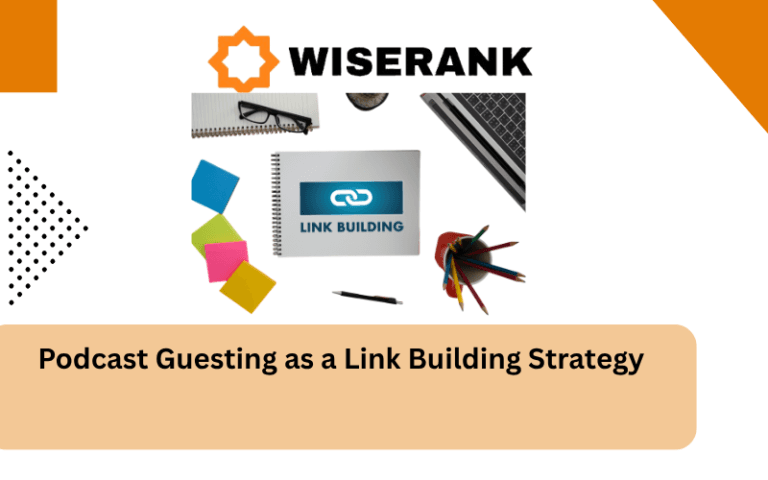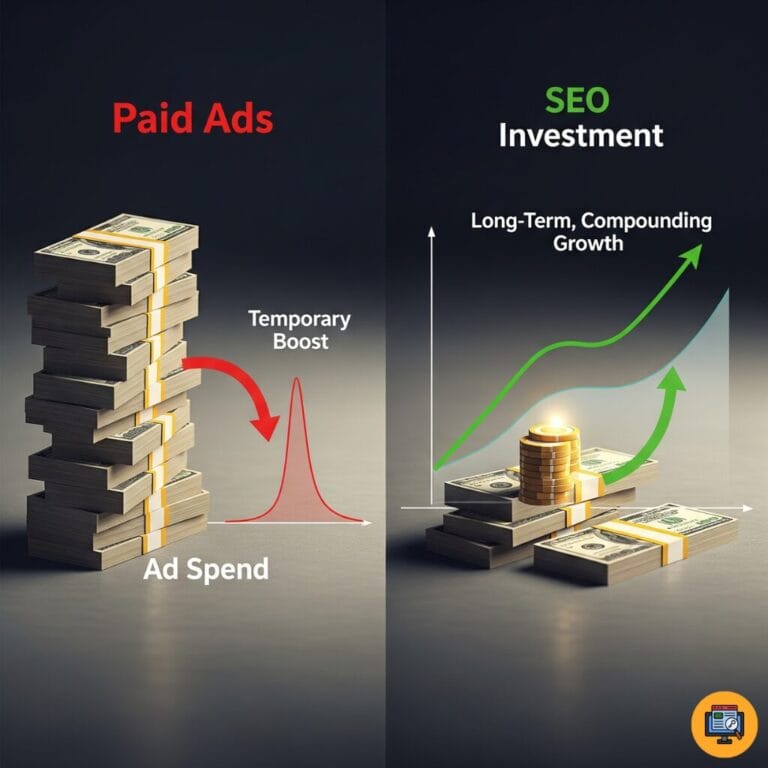What Is Guest Posting and Why It Matters for SEO?
Guest posting involves writing and publishing content on other websites in your industry. This off-page SEO strategy helps you earn quality backlinks, reach new audiences, and establish yourself as an industry expert.
When done correctly, guest blogging provides valuable editorial backlinks that signal authority to search engines while driving targeted referral traffic. However, poor execution can result in penalties and wasted effort.
The SEO Value of Quality Guest Posts
Guest posting remains one of the most effective white hat link building strategies when focused on providing genuine value rather than manipulating rankings.
High-quality guest posts on authoritative sites pass link equity to your website, improve domain authority, and strengthen your overall backlink profile.
How Guest Post Backlinks Impact Rankings?
Editorial links from relevant industry sites carry significant SEO weight, contextual backlinks within quality content perform better than sidebar or footer links, and links from high-authority domains improve your site’s trust signals.
Beyond Backlinks: Additional Benefits
Guest blogging builds brand awareness in your target market, positions you as a thought leader and expert, drives qualified referral traffic from engaged readers, and creates relationship opportunities with influencers and industry leaders.
The Authority Building Factor
Consistent guest posting on respected platforms establishes topical authority, association with trusted brands enhances your credibility, and regular contributions demonstrate expertise and commitment to your field.
Finding High-Quality Guest Post Opportunities
Success in guest posting starts with identifying the right platforms that offer genuine value rather than just accepting any link opportunity.
Target websites with engaged audiences, strong domain authority, and editorial standards that ensure quality.
Research Strategies That Work
Search for “write for us” plus your industry keywords, analyze where competitors publish guest content, use tools like Ahrefs to find sites accepting guest posts, and follow industry publications actively seeking contributors.
Evaluating Site Quality
Check domain authority using Moz or Ahrefs, verify organic traffic through SEMrush, review existing content quality and engagement, and examine whether the site has genuine readers beyond SEO purposes.
Red Flags to Avoid
Sites that publish anything without editorial review, platforms with obvious spam content or thin articles, websites selling guest post placements openly, and domains with suspicious backlink profiles all indicate low-quality opportunities.
Building a Target List
Create spreadsheet tracking potential sites, prioritize based on relevance and authority, note contact information and submission guidelines, and track outreach status and results systematically.
Crafting Guest Posts That Get Accepted
Quality content forms the foundation of successful guest posting. Sites with high standards only publish articles that genuinely benefit their audience.
Your guest post must meet or exceed the quality of content the target site already publishes.
Understanding Editorial Standards
Study the target site’s existing content thoroughly, match their tone, style, and formatting, provide unique insights not already covered, and ensure your writing quality meets professional standards.
Choosing Topics That Resonate
Research what content performs best on the target site, identify gaps in their existing coverage, propose topics relevant to their audience’s needs, and offer fresh perspectives on familiar subjects.
Writing Exceptional Guest Content
Start with compelling headlines that promise value, provide actionable insights readers can implement, include data, examples, and case studies, structure content with clear headings and short paragraphs, and edit thoroughly before submission.
Optimizing Without Over-Optimizing
Include 1-2 natural contextual links maximum, use varied anchor text instead of exact match keywords, link to genuinely relevant resources on your site, and prioritize reader value over SEO manipulation.
Common Guest Post Rejection Reasons and How to Fix Them
Understanding why guest posts get rejected helps you avoid common mistakes and improve your acceptance rate. Most rejections stem from preventable issues related to content quality, relevance, or presentation.
Learning from these common pitfalls allows you to craft submissions that editors actually want to publish.
Why Guest Posts Get Rejected
Improve your acceptance rates by avoiding these frequent mistakes:
- Poor writing quality with grammar errors and weak research
- Topics misaligned with the target site’s audience needs
- Overly promotional content that reads like advertisements
- Generic pitches that show no knowledge of the publication
- Ignoring published submission guidelines completely
- Weak or irrelevant author credentials and expertise
- No unique value or fresh perspective offered
- Content already covered extensively on their site
Effective Guest Post Outreach Strategies
Successful outreach requires personalization, professionalism, and genuine relationship building rather than mass email campaigns.
Quality outreach increases acceptance rates while building valuable industry connections.
Researching Before Reaching Out
Read multiple articles on the target site, understand their content gaps and audience, identify the correct editor or contact person, and find recent examples of accepted guest posts.
Crafting Personalized Pitches
Address the editor by name personally, reference specific articles you enjoyed, propose 2-3 relevant topic ideas with brief descriptions, explain your expertise and why you’re qualified, and keep initial outreach concise and professional.
Outreach Email Best Practices
Use clear subject lines mentioning guest post opportunity, introduce yourself briefly with credentials, demonstrate knowledge of their publication, include writing samples or portfolio links, and make accepting easy with clear next steps.
Following Up Professionally
Wait 5-7 days before following up, send polite reminders without being pushy, accept rejections gracefully, and maintain relationships for future opportunities.
Guest Posting Risks and How to Avoid Them
While guest posting offers significant benefits, certain practices can trigger penalties or waste resources without providing value.
Understanding risks helps you build sustainable strategies that comply with search engine guidelines.
Google’s Stance on Guest Posting
Google accepts editorial guest posts that provide value, warns against large-scale guest posting for links, penalizes manipulative anchor text optimization, and targets sites that exist solely for guest posting.
Common Guest Posting Mistakes
Publishing on low-quality spam blogs, over-optimizing anchor text with exact keywords, guest posting at scale without quality focus, using automated outreach tools ineffectively, and ignoring the target site’s audience all damage results.
Signs of Risky Guest Posting
Sites that guarantee link placement for payment, platforms accepting any content without review, websites with excessive outbound links, and guest post marketplaces selling links openly all present risks.
Penalty Prevention Strategies
Focus on quality over quantity consistently, vary anchor text naturally across posts, ensure genuine value in every article, maintain natural link velocity over time, and choose reputable sites with editorial standards.
Building Long-Term Relationships with Publishers
Successful guest posting extends beyond single transactions to ongoing partnerships that benefit all parties.
Relationship-based link building creates sustainable opportunities and stronger results.
Starting the Relationship Right
Engage with their content before pitching, share their articles on social media genuinely, provide thoughtful comments on their posts, and demonstrate interest beyond just getting a backlink.
Delivering Exceptional Value
Submit articles that exceed expectations, meet deadlines reliably, respond promptly to editorial feedback, and promote published content actively to drive traffic.
Nurturing Ongoing Partnerships
Pitch new ideas periodically when appropriate, share feedback on how your posts perform, help promote their content to your audience, and look for collaboration opportunities beyond guest posting.
Expanding Your Network
Connections with one publisher lead to introductions, quality work generates referrals to other sites, industry relationships create speaking opportunities, and established authority attracts inbound guest post requests.
Measuring Guest Posting Success
Track specific metrics to evaluate whether guest posting efforts deliver worthwhile returns on your time investment.
Data-driven analysis helps refine strategy and focus on highest-value opportunities.
Key Performance Indicators
Monitor rankings for target keywords after publication, track referral traffic from guest posts, measure new backlinks and domain authority changes, and calculate lead generation or conversions from traffic.
Using Analytics Effectively
Set up UTM parameters for guest post links, track conversions in Google Analytics, monitor backlink profile in Search Console, and review domain authority changes in Moz or Ahrefs.
ROI Calculation
Calculate time invested in outreach and writing, measure traffic and leads generated, assign value to backlinks earned, and compare results across different sites.
Optimization Based on Results
Double down on sites driving best results, eliminate low-performing opportunities, refine topic selection based on engagement, and adjust outreach approach based on acceptance rates.
White Hat Guest Posting Checklist
Follow this systematic approach to ensure your guest posting efforts remain ethical and effective while avoiding penalty risks.
Before Outreach
Research target sites thoroughly for quality, verify site accepts guest contributions, identify appropriate contact person, and prepare 2-3 solid topic ideas.
During Writing
Create genuinely valuable original content, follow site guidelines precisely, include 1-2 natural relevant links maximum, and use varied natural anchor text.
After Publication
Promote the published post actively, engage with comments on the article, thank the editor professionally, and track performance metrics systematically.
Ongoing Practices
Maintain natural link velocity without spikes, build genuine relationships over transactions, prioritize audience value over rankings, and monitor backlink profile health regularly.
Guest Posting vs Other Link Building Methods
Understanding how guest posting compares to alternative strategies helps you build balanced link building campaigns.
Guest Posting vs Link Exchanges
Guest posts provide one-way editorial links, offer content value beyond just links, appear more natural to search engines, and require actual effort and expertise.
Guest Posting vs Broken Link Building
Both are white hat strategies, guest posting builds relationships actively, broken link building helps webmasters solve problems, and combining both approaches maximizes results.
Guest Posting vs Digital PR
Digital PR targets higher authority media sites, requires newsworthy stories or data, produces powerful but harder-to-earn links, and guest posting provides more consistent opportunities.
Your Guest Posting Action Plan
Building successful guest posting campaigns requires strategic planning, consistent execution, and focus on quality over quantity.
Start by identifying 10-15 quality target sites in your niche, research their content and audience thoroughly, and develop 3-5 exceptional topic ideas for each.
Create high-quality content that exceeds their current standards, personalize outreach to each site individually, and build genuine relationships with editors and publishers.
Track results systematically to refine your approach, focus efforts on sites delivering best ROI, and maintain natural link velocity through consistent but measured activity.
Remember that guest posting succeeds through providing genuine value to readers, following ethical white hat practices, and building authentic industry relationships. Approach it as content marketing and relationship building that happens to include SEO benefits rather than pure link manipulation, and your efforts will generate sustainable results that strengthen your authority without risking penalties.






